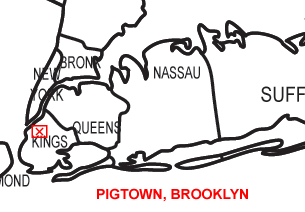 Middle School 320 in Brooklyn is as close to a give-away as you can get. The portrait of Jackie Robinson it displays in some prominence shows the first african american man to play professional baseball in his Dodgers uniform. Students are encouraged to honor his memory for Civil Rights and his business acumen, with his affiliation to the Brooklyn Dodgers relegated to the background as much as possible.
Middle School 320 in Brooklyn is as close to a give-away as you can get. The portrait of Jackie Robinson it displays in some prominence shows the first african american man to play professional baseball in his Dodgers uniform. Students are encouraged to honor his memory for Civil Rights and his business acumen, with his affiliation to the Brooklyn Dodgers relegated to the background as much as possible.
Fortunately, the school has a fair share of children new in the US and with Caribbean roots, so the ignominy heaped on the team of Charles Hercules Ebbets is safe from widespread public memory. The boisterous fans who cheered home runs are long gone, and the days of those who remember Ebbets Field for the vision of its maker, are numbered. Pigeon holes euphemistically called Apartments, have taken the place of a regal stadium and a parking lot honors the team that dodged Brooklyn for Los Angeles.
Flatbush Avenue is known for cheap eateries, but the aroma of Caribbean bakeries has obliterated the stench of garbage that was once heaped here. Pubs with Irish names pour pints with generous hands, and the travails of the homeless who once lived in the open of the vicinity, are drowned in happy oblivion.
Geido’s delightful sushi transports diners so far away, that the history of where they sit has no place in anyone’s mind. Brooklyn mass transit, a beehive of activity at the best of time, peaks in Flatbush and frenzied commuters have no time to ask about the past of the land they tread. Empire Boulevard is every bit as supercilious as its name sounds, and plebian laity given the privilege to drive and stroll in its environs, dare not question as to what once lay at the northern edge of the broad and most elegant road.
Prospect Park, long suffering for its disgraceful erstwhile neighbor, is very particular to remove every last trace of decay from the facade and surroundings of its Willink entrance. The 400 animals that live in the 11 acre Zoo are scarcely reminiscent of their porcine predecessors and are free to live for the love of biological diversity, rather than for their meat. The 51 wooden figurines of the carousel give more recreation and delight than the most expansive of home runs. The harmony of the Music Pagoda drowns out the misery of oppressed people with no rights who once lived amidst garbage nearby.
Brooklyn has taken good care to ensure that the past of the area east of Prospect Park and north of Empire Boulevard is buried deep beyond discovery. The farms that raised pigs to feed Brooklyn have been pushed out far and forever. The usurpers who had the temerity to settle on the land without patent or deed, are gone without a trace. The garbage dump that once raised its ugly head has been moved out of sight, and the stadium Charles Hercules Ebbets built, has been razed to the ground. His team was dissolved almost half a century ago and on the other coast, but it continues to be the butt of jokes to this day. There is no chance that Pigtown will be remembered, at least with any scant love or respect.




